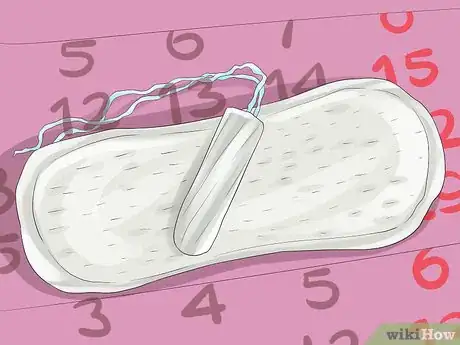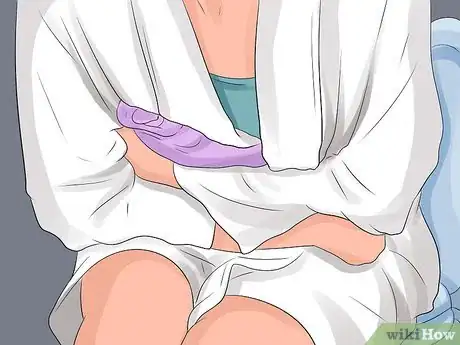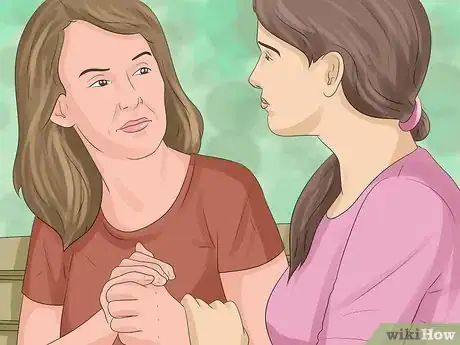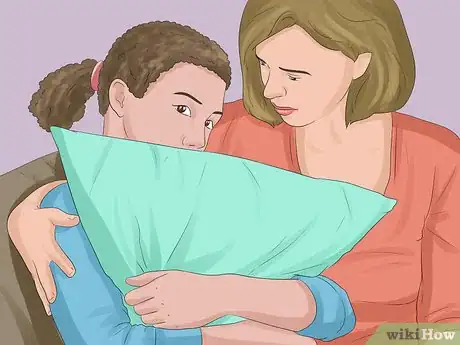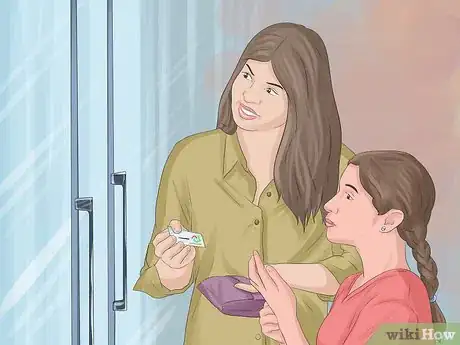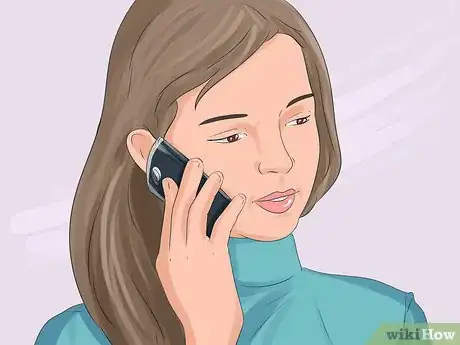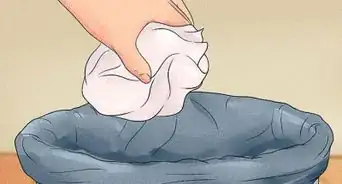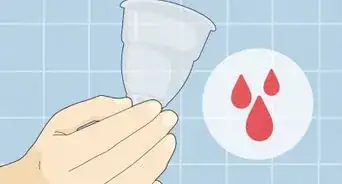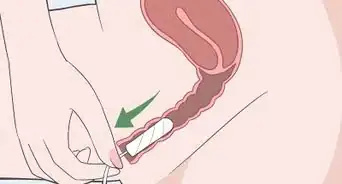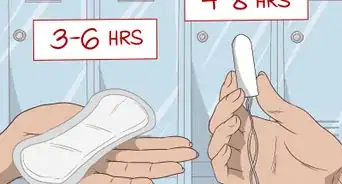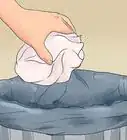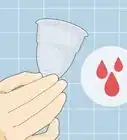This article was co-authored by Aimee Eyvazzadeh, MD, MA. Aimee Eyvazzadeh is a Fertility Specialist and the Founder of The Egg Whisperer Show, a fertility care program focusing on fertility education based in the San Francisco Bay Area. Her work has been featured in magazines such as People, Forbes, and Marie Claire, and she has been featured on the Today Show, Good Morning America, and CNN. She earned an MD from the University of California, Los Angeles in 2001, completed an OB/GYN residency at Harvard Medical School in 2005, and finished a fellowship in Reproductive Endocrinology and Infertility at University of Michigan, where she also completed an MPH.
There are 7 references cited in this article, which can be found at the bottom of the page.
wikiHow marks an article as reader-approved once it receives enough positive feedback. This article received 63 testimonials and 83% of readers who voted found it helpful, earning it our reader-approved status.
This article has been viewed 816,447 times.
Getting your period for the first time can be scary, and the prospect of having to tell your mom can be even worse! But remember that menstruation is a completely normal and natural part of many people’s lives: your mom went through the exact same thing, and so did her mother before her. Even if you are nervous about telling your mom, there’s no reason to be afraid or ashamed. Remember, she has had to do this as well, when she was your age. You’ll most likely look back afterward and wonder what all the fuss was about!
Steps
Coming to Terms With Having Your Period
-
1Learn what having your period means. The menstrual cycle is a monthly process your body undergoes in preparation for pregnancy. In the beginning of the cycle, your body creates more estrogen, which causes the lining of the uterus to thicken with blood and mucous. At the same time, the ovaries release an egg. An egg that gets fertilized by male sperm would attach itself to the thickened uterine wall. But, if the egg is not fertilized, it breaks apart and is expelled by your body. At this time, the excess uterine lining is also shed, and this is what comes out as your monthly period.[1]
- Girls usually get their periods between the ages of 12 and 14, but it can happen as early as 8 or 9 years old.
- Lots of people talk about monthly periods, but it’s pretty normal to be slightly irregular, especially at first. Don’t be worried if you don’t get your period on the exact same day every month. Generally, people get a period every 21 to 35 days, and they usually last anywhere from three to five days.[2]
-
2Find supplies. Every girl has a different preference when it comes to feminine hygiene products. The best way to figure out your favorite is to try them all! You can buy menstrual products at drug stores, grocery stores, and online, but if you know where your mom or sister keeps hers, you can always borrow those until you’ve had the talk with your mom (most people keep them under the sink in the bathroom, in closets or cupboards near the sink or toilet, or maybe in a linen closet near the bathroom). There are actually quite a few of feminine hygiene products on the market, and while some are disposable, other are reusable.
- Pads and liners are disposable, and protect your undergarments by absorbing menstrual fluid after it’s expelled from your body.
- Cloth pads work similarly to pads and liners, but are washable and reusable.
- Tampons are disposable, and are inserted into the vagina and absorb fluid before it’s expelled.
- Menstrual cups are silicone cups that are inserted like tampons, but they get cleaned and reused throughout your period. Because tampons and cups catch menstrual fluid before it comes out, these are ideal for swimming and sports.[3]
Advertisement -
3Control cramps and PMS. Premenstrual syndrome is a term used to describe a variety of symptoms that some people experience in the days or weeks leading up to their period. Although the exact cause isn’t fully understood, PMS seems to be caused by hormonal and chemical changes that occur during the menstrual cycle, and they are possibly affected by diet and vitamin levels as well. Everybody’s different, but symptoms can include depression or heightened emotional reactions, cravings, fatigue, bloating, aches and pains, headaches, and tender breasts.[4] Abdominal cramps are also common during menstruation, and they are caused by contractions of the uterus.
- Anti-inflammatories and pain medicine like acetaminophen, ibuprofen, aspirin, and naproxen can help control cramping and aches.
- Avoid smoking,(which is illegal under the age of 18) drinking alcohol, (which is illegal under the age of 21, or sometimes 18, depending on where you live) consuming caffeine, and excessive salt consumption (this will help prevent water retention and bloating).
- Regular exercise will help reduce menstrual cramping and improve your mood.
- Eat a healthy, well-balanced diet all the time.[5]
- Keep healthy snacks on hand to combat over-indulging your cravings. If you have trouble controlling cravings, opt for healthier snack options. For salt cravings, try homemade rice and soy sauce instead of high-sodium junk food. Make yourself some hot cocoa from scratch instead of binging on chocolate bars. Make your own French fries in the oven if you are craving deep-fried food.
- The best ways to control your period cramps are to exercise regularly, keep your BMI in the normal range, and take NSAIDs like ibuprofen. However, if your pain is severe, see your doctor so you can get an evaluation for fibroids and endometriosis. Your doctor may recommend birth control pills or a progesterone-secreting IUD to help you get relief from cramps.[6]
-
4Prepare yourself for the talk with your mom. It’s important that you stay calm and not panic when you get your period! Although it is completely normal, it is quite a big deal, so don't be afraid to tell your mom. However, you should give yourself time to process the changes happening to your body. Don’t worry if you aren’t ready to tell your mom right away: it’s your body and your choice.
- Before you tell your mom, make sure you are relaxed. Do whatever works for you, whether it’s a bath, walk, book, nap, deep breathing, or something else.
- Think about what you want to say to your mom. Try writing down a few points or questions, or rehearse what you’re going to say.
- You can ask a school nurse, doctor, teacher, or other trusted adult for help if you have questions and still aren’t ready to tell your mom. Sometimes it can be easier to tell someone else first, and then telling your mom won’t seem so hard.
- You can try talking to a friend or sibling first if it's easier. If female chances are they've went through or are currently going through and can give some tips.
Talking to Your Mom in Person
-
1Ask to talk to your mom in private. Find some quiet time when you and your mom can have a chat alone. Don’t freak yourself out! Try not to think about it too much, and instead just dive right in. Remember, she’s your mom; there’s nobody in the world who loves you more, and she understands what you’re going through. Approach the topic any way you like, whether you’ve got a whole song and dance planned, or if you want to start off by saying you feel a little uncomfortable but need to talk to her. If you are having trouble figuring out what to say, try something like:
- “ I think I started my period.”
- “Can we go to the store? I need some things.”
- “This is difficult for me to say, but I’ve started my period.”
- “I don’t know how to say this, but ‘‘it’’ came…”
- " I just wanted to tell you I've started my period..."
-
2Casually bring it up when you’re together. Anytime you are alone together is a great time to approach the subject with your mom, especially if the idea of a formal sit-down with her seems too nerve wracking. You can do it on the way to school, soccer practice, or piano lessons, while watching TV, out for a walk, before she says goodnight, or any other time you have together that isn’t rushed. Casually let your mom know that you got your period.
- Segue into the subject by asking her how old she was when she got her period if you don’t feel comfortable coming out and saying it.
- Work it into a conversation about something completely non-related if you need to. That will give you time to get talking and relax, and then you can slip it in when you feel comfortable.
-
3Make an intentional stop in the feminine hygiene aisle with her. Out shopping together can be a great opportunity to tell your mom about your period without really having to bring it up. Steer her toward the feminine hygiene products in the grocery or drug store, and tell her that you need to pick up some supplies. This is a great time to ask her about recommendations, and she’ll pick up on the fact that you’re trying to tell her about your period.
-
4Ask questions. Getting your period means your body is going through a number of changes. Ask your mom any questions you have. This is a great time for you to bond, and she’ll probably have loads of stuff she wants to talk about.
- Use this time to ask her about sexual health as well if you are comfortable bringing it up.
- Ask if she has any favorite products, what she craves when she’s on her period, and how she manages any PMS symptoms or cramps.
Telling Your Mom Without Being Face to Face
-
1Write your mom a note. Telling your mom in person can be scary, and if you don’t feel confident doing that, you can always tell her with a note. That way, she can initiate the conversation with you next time you’re alone together. Leave the note somewhere private that she’ll definitely find it, like in her purse. Notes can be long and complicated, or short and sweet, like:
- “Hey Mom, I got my period today! Maybe we can get supplies at the drug store later? I love you.”
- “I got my period. Could you please bring home some pads/tampons? Thanks!”
-
2Tell her over the phone. You can still kind of tell your mom in person by doing it over the phone if you really don’t feel comfortable telling her face to face. Use the same techniques and tactics that you would if you were telling her in person, or you can say something like:
- “I’ll be home in an hour, and maybe we can talk for a few minutes, because I got my period.”
- “I’ll be home later than normal because I’m stopping at the drug store for some tampons.”
- “Can we have chocolate cake for dessert? I’ve really been craving it since I got my period!”
-
3Send her a text. Another way to let your mom know what’s going on with you is by sending a text. It’s not the most personal way, but it’ll get the job done! You can use similar phrasing as if you were writing her a more personal letter, such as saying:
- “Just wanted to let you know I got my period. See you at home later!”
- “Can we talk later? I've started my period.”
- “Are you going shopping soon? I got my period and need some supplies.”
References
- ↑ http://www.womenshealth.gov/publications/our-publications/fact-sheet/menstruation.html
- ↑ http://www.webmd.com/women/guide/treating-irregular-periods
- ↑ http://kidshealth.org/kid/grow/periods/period_school.html
- ↑ http://www.mayoclinic.org/diseases-conditions/premenstrual-syndrome/basics/symptoms/con-20020003
- ↑ http://www.womenshealth.gov/publications/our-publications/fact-sheet/premenstrual-syndrome.html
- ↑ Aimee Eyvazzadeh, MD, MA. OB/GYN & Fertility Specialist. Expert Interview. 24 March 2020.
- ↑ http://www.girlshealth.gov/body/period/
About This Article
If you’re feeling a little nervous about telling your mom about your period, ask her if you can talk to her in private. You can tell her about your period however you feel comfortable, whether that’s saying “Mom, I got my first period,” or “You know how you told me about ‘that time of the month’?” Remember, your mom loves you and she has plenty of experience with this subject, so she’ll probably be able to offer you good advice on what products to use and how to ease your cramps. For help understanding what your body goes through during your period, read on!

